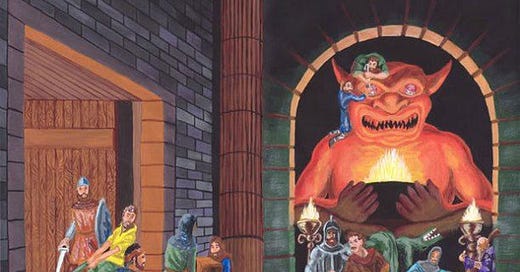The online discourse surrounding the importance of knowing the rules (RTFM) has been one of the most fascinating battles to witness in recent years. The idea that being fluent with the rules would be in any way controversial is still a baffling one. However, despite the good work done by the likes of Krafty Matt and Crossface, there’s still one aspect of rules literacy that people seem to struggle with. This aspect is the players’ duty to be familiar with the rules. The lamentation of many players and GMs is that their game is a “Mother-May-I” game where players are constantly asking if they can do something instead of just doing it. The fact of the matter is that this is a rules literacy issue. Players are not required to know the game as intimately or broadly as GMs, but they are required to know the general and specific rules which effect how they interface with the game. They should know the general “controls” for every character as well as their character’s specific class abilities and the modifiers associated with them. The players have access to the information at their fingertips and need to be willing to use it.
To begin, we should go over what rules the players should be responsible for knowing. As I made reference to in my opening paragraph, the basic rules are a good starting point. These are the rules that effect every character regardless of class or level. In most systems these rules include movement, ability checks, saves, and combat actions. As a player, it is your duty to learn what dice to roll to make a check, save or attack (usually a D20), how far your character can move in a combat round, what to roll for initiative, and what you can do in a given round of combat. You also need to know what your modifiers are for each thing you roll. Fortunately, there are spaces for all of these numbers on your character sheet and you will use these mechanics over and over again. By the end of your first month, you should have enough muscle memory from doing these things that you have them down. Some may learn a little slower and some may learn faster, but the repetition should teach you these things.
Players also need to be responsible for knowing the abilities associated with their class, the utility of their spells, and the damage die/type from their weapons. This, I’ll admit, is where things get a little more challenging. Yes, there can be a lot of information to learn about classes. Spell casters in particular have a lot to read over. However, if you want to make use of these abilities, you need to know how they work. This takes study, trial and error, but the result of putting in this effort will be knowing how to play the game and getting more successes than failures (dice permitting). It is a process though and it does require studying your handbook after hours. This is one of the areas that really separates the people who care about the hobby from the people who are just there for the hang. If you care about the game, you’ll want to play it well and you’ll take the time to get better. If you’re just there for the hang, then you won’t. Some groups might be okay with you only half knowing what you’re doing. Other groups, and other GMs, won’t be okay with it. Honestly, I fall into the latter category. I like hanging out with friends, but I don’t form RPG groups just to socialize. I’m hoping to actually play a game.
To once again invoke Krafty Matt, learning to play an RPG is like learning how to use a fighter in a fighting game. You need to learn the general controls and you need to learn the ins and outs of the specific fighter you chose. Some will do this, get good enough at playing to compete professionally, and will kick ass. Others will just play the game casually. If you’re in the casual camp though, don’t be surprised if someone who takes the game seriously wrecks you and tells you to practice more. Don’t be surprised when people want to take it seriously and don’t try to insinuate yourself into communities that do take it seriously unless you want to as well. If you do want to take it seriously, you need to accept your role in learning how to play and then put in the necessary effort. RPGs are not a mindless hobby and shouldn’t be treated like one. The expectation that you can play the game without having to learn the rules is counterproductive. My advice? Try to read your handbook and understand your class. If you enjoy the process, keep playing. If you hate it, maybe find another hobby. If you’re going to stay though, you need to learn how to play and how to play well.




